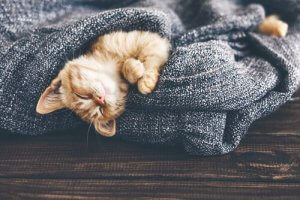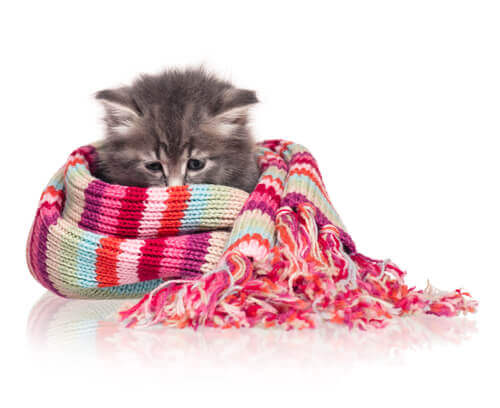Changes in Temperature Affect Your Cat


Written and verified by the lawyer Francisco María García
Changes in temperature are often dangerous for a cat’s health. You should keep this in mind and take action during extreme weather conditions, be it too hot or too cold.
How changes in temperature affect your cat
A cat’s optimal body temperature varies between 100º F and 102º F. In a favorable environment between 68º F and 75º F, cats shouldn’t have difficulty regulating their temperature.
Next, we’ll tell you about the main risks of extreme heat and cold, as well as abrupt climate changes for cats.
Changes in temperature: extreme heat
Cats love warmth, although extremely high temperatures pose different risks to their health. In summer, they require extra measures in order to prevent dehydration, dizziness and other symptoms associated with heat stroke.
It must be remembered that obese felines, and those with long, dense coats, may be more affected by excessive heat. In addition, older and younger cats are a lot more vulnerable to heat stroke.
For all of these reasons, it’s essential to pay attention to your cat and recognize heat symptoms in them in order to take immediate action and avoid further health complications.
Heat exhaustion: symptoms

The first symptoms of heat stroke in cats include the following signs:
- weakness
- loss of appetite
- drooling
- excessive thirst
- tremors
If temperatures continue to rise, and the cat doesn’t receive attention, then the following specific signs may appear:
- awkward movements
- staggering
- acceleration of the heart rate
- bluish or grayish colored tongue
- dehydration
- dizziness
- fainting
Heat stroke in cats is extremely dangerous and it can lead to multiple organ failure. If temperatures rise above 108° F then it could be fatal.
Changes in temperature: extreme cold
Extreme heat is dangerous to a cat; on the other hand, extreme cold can also bring severe complications to a feline’s body and organs.
As cat lovers know, these animals don’t usually tolerate colder temperatures. Furthermore, they’re quick to find a source of heat when cold.
During the winter, you must be particularly alert in order to prevent hypothermia in your cat. Especially if you live in a region with extremely low temperatures and/or sudden climate changes.
Also, be extra vigilant with very young and very old animals, as these are more vulnerable to climatic adversity and might require special care.
How can you tell that a cat is cold

When temperatures drop sharply, the first symptoms that show that a cat is really feeling the cold are usually:
- tremors
- muscular stiffness
- loss of appetite
- changes in behavior: weakness, isolation, lack of energy
When their body temperature drops below 96° F, symptoms of hypothermia in cats may appear. Furthermore, this includes complex symptoms that usually advance rapidly and the cat’s health will deteriorate rapidly.
The main signs of hypothermia in cats are:
- blank stare
- dilated pupils
- difficulty breathing
- altered heart rate
- low blood pressure
- stupor
- fainting
How to prevent damage caused by changes in temperature
The best way to prevent these things is not to expose them to climatic changes to begin with. With this in mind, you must maintain stable temperature conditions at home with the aid of a heating system in winter and a cooling one in summer.
Keep in mind that heating and air conditioners tend to dry the environment, and it could affect a cat’s respiratory system. For this reason, a humidifier is recommended.
On the other hand, it’s essential to provide an indoor place for your cat where they can feel safe, comfortable, and protected.
Changes in temperature are often dangerous for a cat’s health. You should keep this in mind and take action during extreme weather conditions, be it too hot or too cold.
How changes in temperature affect your cat
A cat’s optimal body temperature varies between 100º F and 102º F. In a favorable environment between 68º F and 75º F, cats shouldn’t have difficulty regulating their temperature.
Next, we’ll tell you about the main risks of extreme heat and cold, as well as abrupt climate changes for cats.
Changes in temperature: extreme heat
Cats love warmth, although extremely high temperatures pose different risks to their health. In summer, they require extra measures in order to prevent dehydration, dizziness and other symptoms associated with heat stroke.
It must be remembered that obese felines, and those with long, dense coats, may be more affected by excessive heat. In addition, older and younger cats are a lot more vulnerable to heat stroke.
For all of these reasons, it’s essential to pay attention to your cat and recognize heat symptoms in them in order to take immediate action and avoid further health complications.
Heat exhaustion: symptoms

The first symptoms of heat stroke in cats include the following signs:
- weakness
- loss of appetite
- drooling
- excessive thirst
- tremors
If temperatures continue to rise, and the cat doesn’t receive attention, then the following specific signs may appear:
- awkward movements
- staggering
- acceleration of the heart rate
- bluish or grayish colored tongue
- dehydration
- dizziness
- fainting
Heat stroke in cats is extremely dangerous and it can lead to multiple organ failure. If temperatures rise above 108° F then it could be fatal.
Changes in temperature: extreme cold
Extreme heat is dangerous to a cat; on the other hand, extreme cold can also bring severe complications to a feline’s body and organs.
As cat lovers know, these animals don’t usually tolerate colder temperatures. Furthermore, they’re quick to find a source of heat when cold.
During the winter, you must be particularly alert in order to prevent hypothermia in your cat. Especially if you live in a region with extremely low temperatures and/or sudden climate changes.
Also, be extra vigilant with very young and very old animals, as these are more vulnerable to climatic adversity and might require special care.
How can you tell that a cat is cold

When temperatures drop sharply, the first symptoms that show that a cat is really feeling the cold are usually:
- tremors
- muscular stiffness
- loss of appetite
- changes in behavior: weakness, isolation, lack of energy
When their body temperature drops below 96° F, symptoms of hypothermia in cats may appear. Furthermore, this includes complex symptoms that usually advance rapidly and the cat’s health will deteriorate rapidly.
The main signs of hypothermia in cats are:
- blank stare
- dilated pupils
- difficulty breathing
- altered heart rate
- low blood pressure
- stupor
- fainting
How to prevent damage caused by changes in temperature
The best way to prevent these things is not to expose them to climatic changes to begin with. With this in mind, you must maintain stable temperature conditions at home with the aid of a heating system in winter and a cooling one in summer.
Keep in mind that heating and air conditioners tend to dry the environment, and it could affect a cat’s respiratory system. For this reason, a humidifier is recommended.
On the other hand, it’s essential to provide an indoor place for your cat where they can feel safe, comfortable, and protected.
This text is provided for informational purposes only and does not replace consultation with a professional. If in doubt, consult your specialist.








